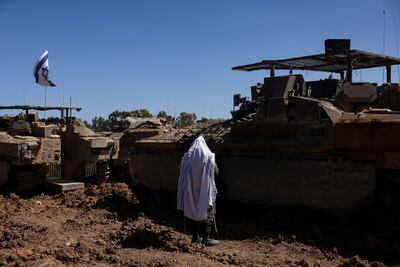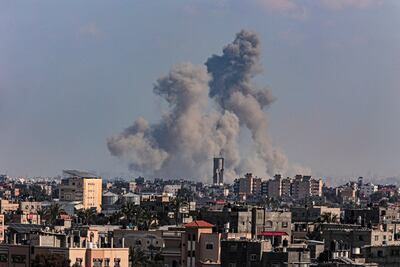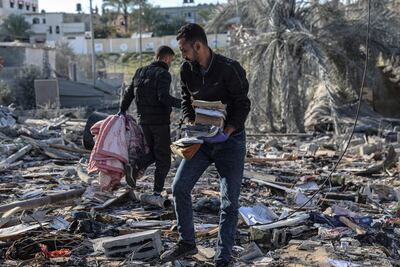Live updates: Follow the latest news on Israel-Gaza
Mediators trying to negotiate a Gaza truce before Ramadan pushed hard and were even forced to make thinly veiled threats at times, but were stymied by the intransigence of Hamas and Israel on top of a range of other difficulties, sources with direct knowledge of the process have revealed.
The mediators from the US, Egypt and Qatar did not secure a ceasefire in Gaza ahead of Ramadan, which began on Monday, after failing to find agreement on key sticking points including the details of a hostage and prisoner swap, Hamas's demand for Israel to withdraw from Gaza, and conflicting plans for the post-war administration of the enclave, the sources told The National.
The negotiations have taken place in Cairo, Doha, Paris and Ramallah over the past three months, bringing together CIA director William Burns, Mossad director David Barnea, his counterpart at the domestic Shin Bet security agency Ronen Bar, Egypt’s intelligence chief Abbas Kamel and Qatari Prime Minister Sheikh Mohammed bin Abdulrahman.
Held behind closed doors at undisclosed locations with no media access, few details have emerged about the conduct of the talks.
But the sources said that, in the pursuit of a deal, delicate and polite diplomacy might have been sacrificed at times.
For example, mediators from Qatar and Egypt have frequently shown Hamas representatives tough love in a bid to compel the group to soften its conditions. At times, Hamas delegates were at the receiving end of harsh words. Thinly veiled threats were also made, the sources said.
On the other side, the Mossad chief heard scathing criticism of Prime Minister Benjamin Netanyahu’s Gaza policy from Egyptian and Qatari mediators, according to the sources.
“Dealings by the Qataris and Egyptians with the Mossad and CIA delegates have been businesslike and pragmatic on the whole but they were tense sometimes,” said one of the sources.

Logistics provided another headache.
Hamas is designated a terrorist group by the US and Israel, so negotiators from those two countries could not deal directly with the group’s representatives, leaving it to mid-ranking and junior operatives from Egypt to act as go-betweens when the talks were held in Egypt.
They delivered to the Hamas delegates verbal messages, drafts and handwritten notes given to the Egyptians by the American and Israeli negotiators to pass on, the sources said.
During the talks in Egypt, Hamas delegates used offices and accommodation separate from those of the US and Israeli negotiators although everyone stayed at one secure complex east of Cairo, they said.
Further complicating matters, Egypt has a chequered past with Hamas, particularly its current leader in exile, Ismail Haniyeh.
Mr Haniyeh angered Egypt when his Gaza government inspired tens of thousands of Palestinians to overrun Gaza’s border with Egypt in 2008 to protest against the siege of the enclave, which began a year earlier.
Three years later, according to authorities in Cairo, Hamas again left Egypt seething when it sent an armed contingent into Egypt to free several imprisoned leaders of the now-banned Muslim Brotherhood during the chaos of the 2011 popular uprising.
Cairo later accused Hamas of playing a part in a series of terrorist attacks in Egypt to avenge the army's removal in 2013 of president Mohammed Morsi of the Muslim Brotherhood.
The military's action was led by current President Abdel Fattah El Sisi, who was defence minister at the time.

“Egypt deals pragmatically with Hamas delegates but there is no warmth in that relationship, the past has not been forgotten,” said another of the sources. “Their movement in Egypt is closely supervised and somewhat restricted and their access to [Egypt’s intelligence chief] Abbas Kamel is limited.”
Egypt’s negotiators, meanwhile, recognise Hamas’s decisions are not made by leaders in exile, such as Ismail Haniyeh or Khaled Meshaal, but by Yahya Sinwar, the group's powerful chief in Gaza who has the loyalty of its military wing.
That brings another set of problems.
Contacting Mr Sinwar, Israel’s most-wanted man, has not been easy.
Believed to be hiding in Hamas’s elaborate network of underground tunnels in Gaza, Mr Sinwar is known to have taken his personal security precautions to an extreme level since his close aide and confidante Saleh Al Arouri was assassinated by Israel in Beirut in January.
Those measures have meant reaching him has become difficult and time-consuming for Egyptian and Qatari negotiators.

For example, said the sources, Mr Sinwar no longer has a mobile phone on or near him and can be contacted only through a handful of trusted aides. His messages, both handwritten and audio, are laced with code. He also uses an alias.
Adding to the pressure faced by the mediators is that the negotiations have been held against the backdrop of a rapidly rising death toll among Palestinians in Gaza – more than 31,100 so far, with more than twice that number injured, widespread destruction and a humanitarian crisis in which many of Gaza’s 2.3 million residents are facing famine.
Israel’s threat to take its devastating ground operations to the city of Rafah in southern Gaza is another source of grave concern. More than half of Gaza’s residents are sheltering in the city on the Egyptian border.
If Israel goes ahead with an invasion of Rafah, mediators fear the civilian death toll would rise dramatically.
The Gaza war was triggered by an attack on southern Israel led by Hamas on October 7, in which 1,200 people were killed and about 250 taken hostage.


